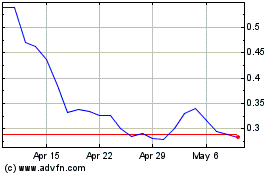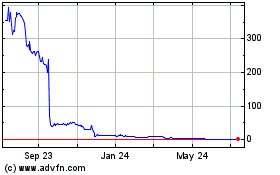Seelos Therapeutics Announces Final Data from Phase I PK/PD Study of Intranasal Racemic Ketamine (SLS-002) and Clinical Devel...
June 23 2020 - 7:00AM

Seelos Therapeutics, Inc. (Nasdaq: SEEL), a clinical-stage
biopharmaceutical company focused on the development of therapies
for central nervous system disorders and rare diseases, today
announced final safety data from its Phase I
pharmacokinetics/pharmacodynamics (PK/PD) Study of Intranasal
Racemic Ketamine (SLS-002) as well as the planned design of a
double blind, placebo-controlled Proof of Concept (PoC) study for
Acute Suicidal Ideation and Behavior (ASIB) in patients with Major
Depressive Disorder (MDD) to begin in the fall of 2020. Seelos is
planning to initiate this PoC study in two parts: Part A is an
open-label study of 16 patients, and will be followed by Part B
which is a double blind, placebo-controlled study of approximately
120 patients. “Today’s announcement marks the most significant
event so far in Seelos’ brief history,” said Raj Mehra, Ph.D.,
Chairman and CEO of Seelos. “It is heartening to see that all
intranasal doses were judged to be generally safe and well
tolerated, and the resolution of dissociative side-effect among all
doses by the one hour timepoint for this group mean affords that
this therapy is truly differentiated, which enables Seelos to
evaluate SLS-002 in indications beyond ASIB, such as first line
MDD.” Key Highlights from the Phase I PK/PD Safety Data (total
enrollment 62 subjects)
- All doses were safe and well tolerated.
- There were no new or unique safety signals.
- There were no serious adverse events.
- All adverse events (AEs) were transient and were clinically
manageable.
- Mild increase in blood pressure noted in seven subjects – all
were transient and resolved without intervention:
- 30 mg – 1 subject
- 60mg – no subjects
- 75mg – 4 subjects
- 90mg – 2 subjects
- Clinician-Administered Dissociative States Scale (CADSS)
- Mean values at one hour post dose:
- 30 mg – 0.2
- 60 mg (measured at 1.5 hours post dose per protocol) – 0.4
- 75mg – 1.1
- 90 mg – 1.0
- No subject had a score > 4 at the two hour timepoint or
thereafter.
- Group mean for each dose group resolved to < 4 by the one
hour timepoint and all timepoints thereafter.
- CADSS is a 23 item scale, where each item is scored 0-4, and
the total max score possible is 92. Scores > 4 are judged as
clinically meaningful dissociation. As expected, mean increases
> 4 were noted at higher doses (75 mg and 90 mg), correlating
with peak concentrations (~40 mins).
- Most common AEs in drug cohorts (>20%) in order of
prevalence:
- Dysgeusia (bad taste)
- Dizziness
- Feeling intoxicated
- Somnolence
- Headache
- Oral hypoaesthesia (numbness)
- Blurred vision
- Euphoric mood
- Fatigue
- Most common AEs in placebo (>20%) were dysgeusia and
somnolence
Key Highlights for the Design of the Proof of Concept Study
- Trial duration will be 16 days (approximately seven days
inpatient and nine days outpatient), dosing twice weekly (five
total doses), and safety follow up for two weeks.
- The primary endpoint to be evaluated will be the change from
baseline on the Montgomery–Åsberg Depression Rating Scale (MADRS)
at 24 hours after first dose and the persistence of effect at Day
16 compared to placebo.
- The key secondary endpoint to be evaluated will be the change
from baseline on the Sheehan-Suicidality Tracking Scale (S-STS)
Clinically Meaningful Change Measure Total Score at 24 hours after
first dose and persistence of effect at Day 16 compared to
placebo
- The trial will be composed of two stages:
- Part A of the trial will begin with an open-label, non-placebo
study of 16 patients, and
- Part B is currently planned to enroll approximately 120
patients to be randomized 1:1 to receive standard of care plus
either SLS-002 or an intranasal placebo.
Seelos will also host a key opinion leader (KOL) call today at 1
p.m. Eastern time. The call will feature a discussion with Michael
E. Thase, MD, professor of psychiatry at the Perelman School of
Medicine at the University of Pennsylvania. Dr. Thase is an active
clinical investigator whose research focuses on mood disorders and
will be available to answer questions at the conclusion of this
call. The details of the call are provided below: Dial-in
and Webcast
InformationDomestic: 1-877-407-0789International: 1-201-689-8562Conference
ID: 13704973Webcast: Click Here for
Webcast
About SLS-002 SLS-002 is intranasal racemic
ketamine with two investigational new drug applications, for the
treatment of Acute Suicidal Ideation and Behavior in Major
Depressive Disorder and in Post-Traumatic Stress Disorder. SLS-002
was originally derived from a Javelin Pharmaceuticals,
Inc./Hospira, Inc. program with 16 clinical studies involving
approximately 500 subjects. SLS-002 addresses an unmet need for a
therapy to treat suicidality in the U.S. Traditionally,
anti-depressants have been used in this setting but many of the
existing treatments are known to contribute to an increased risk of
suicidal thoughts in some circumstances, and if and when they are
effective, it often takes weeks for the full therapeutic effect to
be manifested. The clinical development program for SLS-002
includes two parallel healthy volunteer studies (Phase I), expected
to be rapidly followed by pivotal registration studies after
meeting with the FDA. We believe there is a large opportunity in
the U.S. and European markets for products in this space. Based on
information gathered from the databases of the Agency for
Healthcare Research and Quality, there were more than 1,000,000
visits to emergency rooms for suicide attempts in 2019 in the U.S.
alone. Experimental studies suggest ketamine has the potential to
be a rapid, effective treatment for refractory depression and
suicidality. About Michael E. Thase, MD Michael E.
Thase, MD, joined the faculty of the Perelman School of Medicine at
the University of Pennsylvania in 2007 as Professor of Psychiatry
after more than 27 years at the University of Pittsburgh Medical
Center and the Western Psychiatric Institute and Clinic where he
directed the Depression Treatment and Research Program from its
inception in 1987. Dr. Thase obtained his medical degree at the
Ohio State University in 1979. He served as an intern, resident,
and fellow at the Western Psychiatric Institute and Clinic before
joining the University of Pittsburgh School of Medicine in 1983 as
an assistant professor of psychiatry. A fellow of the American
Psychiatric Association, Dr. Thase has received numerous honors in
his field, including the Marie Eldredge Award from the American
Psychiatric Association. He is also a member of many professional
and scientific societies, including the American Medical
Association, the American College of Neuropsychopharmacology, and
the Society for Psychotherapy Research. He has co-authored more
than 340 scientific articles and book chapters, as well as seven
books. His published articles are featured in various journals,
including Archives of General Psychiatry, the American
Journal of Psychiatry, and the British Journal of Psychiatry.
He is the editor-in-chief of Psychopharmacology Bulletin. A
consultant and lecturer, Dr. Thase remains active in the community
by giving numerous presentations at state hospitals. He also
presents seminars for community hospitals and the Office of
Education and Regional Programming. About Seelos
Therapeutics Seelos Therapeutics, Inc. is a clinical-stage
biopharmaceutical company focused on the development and
advancement of novel therapeutics to address unmet medical needs
for the benefit of patients with central nervous system (CNS)
disorders and other rare diseases. The Company's robust portfolio
includes several late-stage clinical assets targeting indications
including Acute Suicidal Ideation and Behavior (ASIB) in Major
Depressive Disorder (MDD) or Post-Traumatic Stress Disorder (PTSD),
Sanfilippo syndrome, Parkinson's Disease, other psychiatric and
movement disorders plus orphan diseases. For more information,
please visit our
website: http://seelostherapeutics.com, the
content of which is not incorporated herein by reference.
Forward-Looking Statements Statements made in this
press release, which are not historical in nature, constitute
forward-looking statements for purposes of the safe harbor provided
by the Private Securities Litigation Reform Act of 1995. These
statements include, among others, those regarding the expected
timing to begin the Proof of Concept (PoC) study of SLS-002 for
Acute Suicidal Ideation and Behavior (ASIB) in patients with Major
Depressive Disorder (MDD), the proposed design of the PoC study,
the number of patients to be enrolled in the PoC study, the
expected duration of the PoC study, the primary and secondary
endpoints to be evaluated in the PoC study and Seelos’ ability to
evaluate SLS-002 in indications beyond ASIB, such as first line
MDD. These statements are based on Seelos' current expectations and
beliefs and are subject to a number of factors and uncertainties
that could cause actual results to differ materially from those
described in the forward-looking statements. Risks associated to
Seelos' business include, but are not limited to, the risk of not
successfully executing its preclinical and clinical studies,
including the proposed PoC Study of SLS-002, and not gaining
marketing approvals for its product candidates, the risks
associated with the implementation of a new business strategy, the
risks related to raising capital to fund its development plans and
ongoing operations, risks related to Seelos' current stock price,
risks related to the global impact of COVID-19, as well as other
factors expressed in Seelos' periodic filings with the U.S.
Securities and Exchange Commission, including its Annual Report on
Form 10-K and Quarterly Reports on Form 10-Q. Although we believe
that the expectations reflected in our forward-looking statements
are reasonable, we do not know whether our expectations will prove
correct. You are cautioned not to place undue reliance on these
forward-looking statements, which speak only as of the date hereof,
even if subsequently made available by us on our website or
otherwise. We do not undertake any obligation to update, amend or
clarify these forward-looking statements, whether as a result of
new information, future events or otherwise, except as may be
required under applicable securities laws. Contact Information:
Anthony Marciano Head of Corporate Communications Seelos
Therapeutics, Inc. (Nasdaq: SEEL) 300 Park Ave., 12th Fl New York,
NY 10022 (646) 293-2136
anthony.marciano@seelostx.comhttps://seelostherapeutics.com/https://twitter.com/seelostxhttps://www.linkedin.com/company/seelos
Seelos Therapeutics (NASDAQ:SEEL)
Historical Stock Chart
From Mar 2024 to Apr 2024

Seelos Therapeutics (NASDAQ:SEEL)
Historical Stock Chart
From Apr 2023 to Apr 2024
